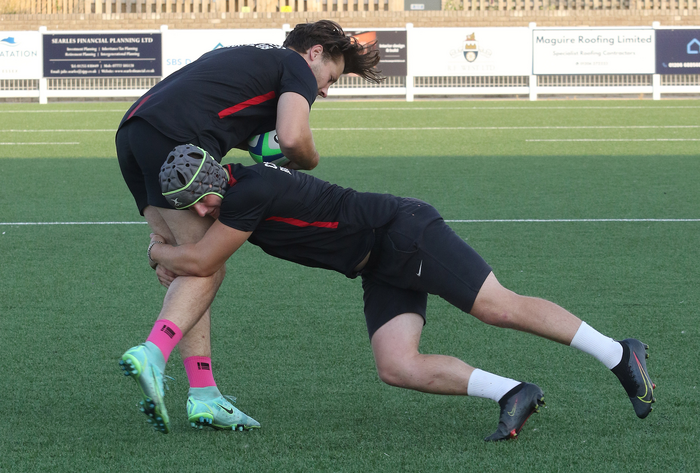Concussion in grassroots rugby will be investigated in a new cutting-edge technology trial which could transform player safety across the globe.
For the first time the impact of collisions, head injuries and recovery time will be explored across an entire amateur season by researchers at the University of Essex working with wearable tech firm PhysiGo and Colchester Rugby Club’

Credit: The University of Essex/East News
Concussion in grassroots rugby will be investigated in a new cutting-edge technology trial which could transform player safety across the globe.
For the first time the impact of collisions, head injuries and recovery time will be explored across an entire amateur season by researchers at the University of Essex working with wearable tech firm PhysiGo and Colchester Rugby Club’
The study comes as the devastating impact of repeated head trauma hits the headlines with some professional players – including England ace Steve Thompson and former Wales captain Ryan Jones – announcing they are suffering from early-onset dementia.
The research team, from Essex’s School of Sport, Rehabilitation and Exercise Sciences, will record impacts and rotational forces experienced by players using wearable GPS units with embedded artificial intelligence.
The devices combined with rigorous scientific testing will allow Dr Ben Jones to study the first team and youth side across all 22 games of their gruelling season.
Dr Jones, a former England 7’s international who also played scrumhalf for Premiership Rugby sides Northampton Saints and Worcester Warriors, said: “This isn’t a case of trying to make the game soft or ruining it for the millions of people who enjoy it the world over, we just need to know more about its potential risks.
“For years elite athletes have had the benefit of high-level analysis whereas the clubhouses that are the foundation of the game have been left behind.
“Through this study, we can help improve safety and safeguard the sport for future generations.”
Over eight months, forwards and backs’ baseline brain activation will be monitored off-pitch using functional near-infrared spectroscopy combined with cognition testing.
This will allow the team of sports scientists to see if and why key measures of cognition like brain oxygenation levels and differences in general blood flow are affected.
The location and effect of persistent low-level impacts will also be assessed to understand if tackles, small collisions and bumps affect mental ability.
Talks are also underway with governing bodies to introduce sensor-equipped head guards that will provide additional data on concussion risk.
England and British and Irish Lions legend Rory Underwood MBE sits on PhysiGo’s Advisory board.
He said: “We are not looking to reduce the physicality of the game but use innovative ways of collecting data to gain a better awareness and understanding of the impact of the game.
“This will provide coaches, medical and S&C staff, and players with better quality information and insight to enable better decision making when managing player welfare and “Return to Play” protocols.
“The aim is to make the game as safe as possible for players, without losing the physical nature of the sport, to improve and prolong their playing career, at all levels.”
Colchester Rugby Club, who play in the Regional 1 South East League, have welcomed the study and the data it will give them.
Club Chairman Karl O’Brien said: “This research underlines our commitment to player welfare
“We are a large community club with five senior men’s teams, in excess of 600 mini and youth players, an ever-growing number of girls and ladies’ teams plus a newly formed LGBT squad of players and as always are fully committed to all of these players enjoying their rugby in a safe environment.
“To be allowed to work with the excellent team from the University of Essex is absolutely fantastic for us all and we are proud to be helping people to enjoy the great game for many years to come as safely as possible.”
PhysiGo is in close contact with World Rugby and is hopeful their equipment – which is designed to be affordable for small clubs – will be introduced in coming years.
The work with Colchester and Essex comes after training research with Alton RFC, in Hampshire, Downlands College in Australia, and Cambridge University Hospital trust.
Matt Baker, chief operating officer and co-founder of PhysiGo, said: “PhysiGo is committed to improving people’s health through AI-enabled wearables and it is especially important in contact sports like Rugby.
“This kind of technology is being made available to elite clubs but we feel it is very important to work with grassroots like Colchester RFC and at a price that is inclusive to all.”




